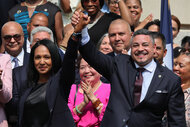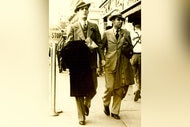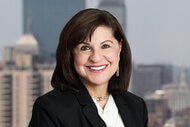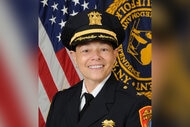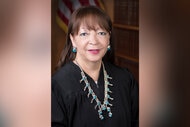Create a free profile to get unlimited access to exclusive videos, breaking news, sweepstakes, and more!
4 Questions For 4 Latina Criminal Justice Trailblazers: Tiffany Cabán
In honor of Hispanic Heritage Month, Oxygen.com asked four trailblazing Latinas to talk about their professional experiences in our system of law and order. Tiffany Cabán believes that justice is "not about “good” people and “bad” people, it’s about opportunities to heal, it’s about opportunities to access resources.
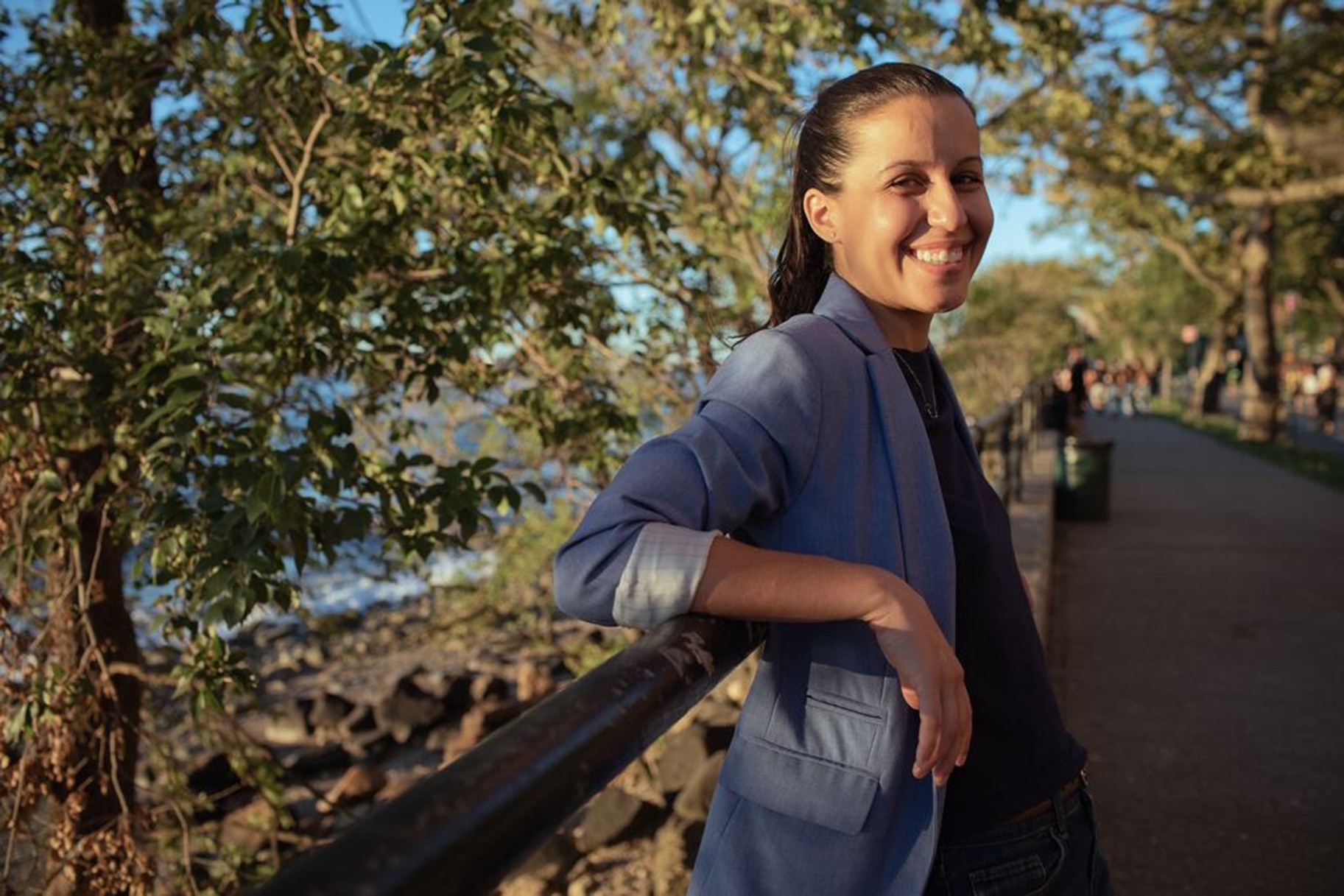
Tiffany Cabán is poised to be the first queer Latina to represent Queens on the New York City Council after winning the Democratic primary in June. She's also one of only three Latinas to ever represent Queens on the council. Her district, which includes the neighborhoods of Astoria, parts of Woodside, East Elmhurst and Jackson Heights, and Riker's Island, is heavily Democratic, and she faces untested Republican and Green party challengers. In her 2019 campaign for the Democratic nomination for Queens District Attorney she lost by less than 60 votes. So the odds are decidedly in her favor.
But before getting into politics to join a wave of district attorney candidates pushing for decarceration policies, Cabán began her legal career on the other side of the aisle as a public defender, serving indigent clients in New York County for three years with the Legal Aid Society and then for another four with the New York County Public Defender Service. It came from — and gave her — a very unique perspective on our criminal legal system, which she regularly hesitates to call a "criminal justice system."
Oxygen: What made you want to be a public defender?
It’s the reason that I went to law school; I went to law school knowing that I wanted to be a public defender. I tell people that public defense is trauma work… and quite often what brings you to trauma work is your own trauma. It was my personal experiences with interpersonal relationships — family, community experiences — that led me to that work.
And there were really two experiences that politicized me significantly and brought me down that path.
One was very early in my childhood. My family is from Puerto Rico. My parents — both sides of my family — grew up in public housing. My maternal grandfather was someone who struggled with alcoholism; he was very physically and emotionally abusive. He caused a lot of harm in my mother’s home to the point that my grandmother left him and my mom dropped out of high school to help take care of the family.
What had been modeled for my mother, though, was unhealthy relationship dynamics, that’s what she found in her relationships, and our family struggled with different, but in some ways similar, challenges and harms. As a small child, I was personally struggling.
Then my grandfather was was sick; he was essentially drinking himself to death and my mom wanted her father to get to know his grandkids and for her children to know their grandfather. So he came to live with us for a little while.
So here was my grandfather in our home; I loved him. He was patient, he was kind, he played the guitar for me all the time, he taught me all these fantastical stories. I hung on his every word. He helped me so much as a kid. And then he passed away.
When I got a lot older, I thought about the fact that here was this abusive husband and father, and this really incredible patient, kind grandfather. They were both so equally true. It’s not just about “good” people and “bad” people — and locking up the “bad” people.
The story that doesn’t get told is that he was a dirt-poor kid from Puerto Rico, who joined the Army, served, was a combat veteran, came home with PTSD, self-medicated with alcohol. He’s somebody that could’ve been cycling in and out of our criminal justice system. Where were the systems to support him so that he could support his family?
The other thing that politicized me is that I went to public school for elementary and junior high, in a lower income neighborhood with majority folks of color. But my dad’s union gig was a difference-maker in my family. He busted his butt and he sent me to a Catholic high school two buses and an hour commute away.
It was a world of difference. I had friends at home who were getting suspended or arrested, and were struggling with a lack of access to different resources, and then I had kids I was going to high school with doing the same stupid, knuckle-headed shit, and the responses were different: “We have to protect their futures.” There were all these team sports and extracurricular activities and investment in them.
And so I just deeply internalized this idea that it’s not about “good” people and “bad” people, it’s about opportunities to heal, it’s about opportunities to access resources. That is at the core of whether we have the ability to thrive, to be in healthy relationships with others, and to be safe, collectively.
What did it mean to you, or what do you feel like it’s meant to some of your clients or their families, to see a Latina in your role in the criminal justice system, given how disproportionately those roles tend to be filled by white men?
It meant everything: Two percent of lawyers are Latinas and five percent are Black women. It’s not because we’re not smart, it’s not because we don’t care, it’s not because we don’t dream about being lawyers. But we very intimately know the barriers to access.
And there is nothing like shared experience. There is nothing like stepping into the booth and hearing somebody’s story and being like, "I hear you, I understand that” and speaking the same language.
The criminal legal system is so, so dehumanizing, even down to the language: you’re a number; you’re a rap sheet, you’re a penal code. You’re dehumanized every step of the way.
So there’s also something incredibly humanizing when you see someone who looks like you, who mirrors your life experience. All of that resonates. Then it’s very clear that we’re both deeply invested in one another and that goes a very long way.
Do you think the criminal justice system functions well for Latinos in America in general right now?
No, absolutely not. I think we get sold this promise, that the system provides safety, but the fact of the matter is that it doesn’t keep us safe. The sources of safety — and not just anecdotally, but empirically — are: opportunities to heal; access to housing, health care, educational opportunities, job opportunities; having a neighborhood infrastructure that allows you to meet your basic human needs; maintaining relationships. All of these things are proven to make us safer.
Our system is really centered around punishment, and around really harmful "personal responsibility" narratives. It doesn’t acknowledge where accountability begins and ends.
My grandfather’s story is many other folks’ stories about how we could’ve prevented harm or acts of harm of survival or necessity by just providing people with their basic needs — which, by the way, are present in whiter, wealthier communities in terms of access.
All of these things are layered and complex. If you talk to any public defender, any judge, any prosecutor, we will all agree that, one day, an individual might be my client — the defendant in a case — and the next day they might be the victim in a case, and the next day they might be a witness in a case. There are all these different places their lives intersect the criminal legal system, and that overlap, that intersection, is really important to name: hurt people hurt people on the most basic level.
We know that the strategies that work to change behavior are not isolationist strategies: they’re not locking someone up in a cage for an extended period of time and then dropping them back in our communities no better but often — 99 percent of the time — the worse for wear.
I always tell people: focus on outcomes. What do you want to see happen? Because certainly, when you talk to survivors and victims, they will say, “I want to heal, I want to make sure I’m never hurt the same way again, I want to make sure nobody else is hurt the way that I was hurt.” There’s nothing about the mechanisms in our criminal legal system that focuses on those things and effectively delivers those results. And there are so many beautiful, wonderful strategies we could be implementing in our communities that do.
But if you look at the history of our system, it is functioning in the way that it was meant to in terms of imposing social control in terms of oppressing marginalized communities. Black, brown, Latinx, low income, immigrant, queer, disability communities are all disproportionately impacted by our criminal legal system. And what policing was borne out of — the first iterations of policing — was not to keep our communities safe, but for slave catching and union busting.
Knowing your history is really important to be able to accurately pinpoint whether a system is broken or functioning the way it was supposed to, and whether it is useful or needs to be moved away from or reimagined.
What would you like other people in your community to understand about participating in the criminal justice system in the way that you have?
I have so much love to public defenders who do this work. We have absolutely everything stacked against us, day in and day out, It’s a rigged game where we lose overwhelmingly more than we win, where even the wins are complicated, and we keep grinding.
All of our work, if you are grounded in helping and uplifting your community and in battling and tearing down systems of oppression, there are a million strategies that are in play all at once. They are all important and invaluable and necessary.
This is one strategy: You can work inside of the system, within the constraints, and try to reduce harm. I see working within the criminal legal system, in the way that I do and the way that some other folks do — because I would say that some players in the legal system perpetuate harm — as a way to try and reduce harm. And it’s all in an effort to be able to be in relationship and in partnership with other strategies outside the criminal legal system to create some different solutions that help, uplift, heal and strengthen our communities.
I look at the relationship between when I was a public defender — reducing that harm and providing person-to-person support — and now transitioning to the work that I will do in government — where the goal is to change dominant institutions and to put bigger, broader systemic changes in place. Each can’t exist without the other. There is such a need for folks that have the ability and capacity to engage in public defender work to do it. And systems of support for them are important because it is hard work, and vicarious trauma is a real thing.
